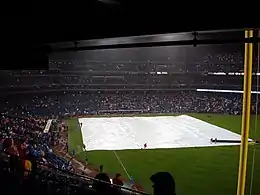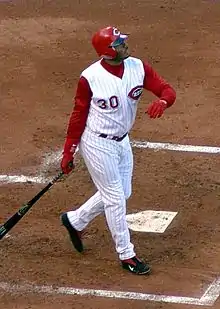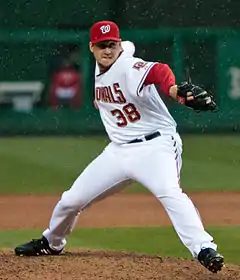Suspended game
A suspended game in baseball occurs when a game has to be stopped before it can be completed, and the game is meant to be finished at a later time or date. Suspended games are used in Major League Baseball, Minor League Baseball, and may also be used at other levels of play (such as college baseball or the Little League World Series) depending on league or tournament rules.

Rules
Major League Baseball (MLB) Rule 7.02, "Suspended, Postponed, and Tie Games", details the circumstances under which a game may be suspended. In general, a game becomes suspended when it is halted by:[1]
- A curfew imposed by law
- A predetermined time limit
- Artificial light failure or other mechanical problems that impact the game
- Darkness, if the lights cannot be turned on as a result of local law
- Inclement weather during an official game (that is, enough innings have been played to yield a result) and an inning is in progress, and during that inning the visiting team took the lead, and the home team has not retaken the lead (as the home team might still tie the game or retake the lead)
- A regulation game called with the score tied
The rule goes on to describe when the game can or must be resumed. Typically, it is to be resumed right before the next scheduled game between the two clubs at the same location. Alternative scenarios are also outlined.
Note that following the 2008 World Series, MLB adopted a rule that now requires all postseason games to be played to completion (at least nine innings); situations where inclement weather might otherwise end a game early now result in a postseason game being suspended and resumed.[2]
History
Originally, the ability to start or continue a baseball game was determined almost entirely by weather; baseball rules still state that if there are several factors in play, weather overrides the others.
Before artificial lighting was available, games that ran out of sunlight or clear skies were simply called, resulting in ties. There were tied games in three different early World Series (1907, 1912, and 1922) as well as some of the pre-modern World Series (1885, 1890, and 1892). Called games that ended in ties were simply replayed, if necessary, as was done with those World Series games.
With the advent of ballpark lighting in the 1930s, the need for suspended games arose, for the sake of fairness and to prevent "shenanigans" on the part of the home team. The rules were expanded over time, to cover other situations. Wrigley Field, which did not acquire lights until August 1988, would sometimes see games called due to darkness. The rule was extended to cover darkness, again in the sense of fairness, as the setting sun was equated to "light failure". The further extension of the rule to suspend, rather than call, games interrupted by rain was also done in part to prevent stalling tactics. Suspended games are much more common since the rules were expanded—prior to 1943, there had only ever been five instances, mainly resulting from games being protested;[3] there were six suspended games during just the 1944 season[4]—and tied games have consequently become much less common, at least at the major league level.
Two of the longest games in professional baseball history were suspended games:
- The longest professional baseball game, a minor league game started on April 18, 1981, was suspended with the score tied after the 32nd inning, at approximately 4 a.m. on April 19. The game was resumed two months later, and ended in the 33rd inning.
- On May 8, 1984, the Chicago White Sox and Milwaukee Brewers played 17 innings at Comiskey Park, then suspended the game due to a league-imposed curfew. The game was completed the next day, with Harold Baines winning the game for Chicago with a home run in the 25th inning.
By rule, all statistics for suspended games (and also games that last past midnight) are recorded under the date on which the game started.
Oddities
That events in a suspended game are considered (with regards to baseball statistics) to have occurred on the original game date, can create unusual situations. For example, it can result in a player having statistics from games that pre-date when he joined a team or first played in MLB. An example of this occurred with first baseman Vince Shupe in 1945. Shupe played in his first major league game on July 7 with the Boston Braves,[5] and later played in the resumption of a suspended game on August 4.[6] As the suspended game had started on June 17, Shupe has major league statistics that carry the date of that game, from weeks before he joined the Braves.[7]
Having a game suspended can leave in question the status of a player's streak of some kind, such as a hitting streak or consecutive games played without committing an error. Additionally, the rules for substitutions in suspended games could allow a player to make an appearance for both teams in the same game, if he were traded between teams during the time that the game was suspended. This could potentially result in what would otherwise be statistically impossible situations for a pitcher, such as being credited with both a loss and a save in the same game.[lower-alpha 1] However, such scenarios around a traded player have not occurred in Major League Baseball to date.
Notable suspended games
A number of suspended games in major league history have been notable due to unusual circumstances or statistical oddities.
Pine Tar Incident (1983)
An unusual suspended game occurred as a result of the pine tar incident on July 24, 1983. George Brett had apparently hit a home run for a 5–4 lead for his Kansas City Royals over the New York Yankees. When the home run was initially disallowed and Brett declared out due to too much pine tar on his bat, this apparently marked the game's final out and ended play with the Yankees apparently winning 4–3. A successful appeal to American League president Lee McPhail reinstated the home run and negated the out, but as play had long since ended it became a suspended game. The suspended game was resumed on August 18, 1983, and it was completed uneventfully, with the 5–4 Royals' lead holding up for a win.[8][9]
Pirates–Cubs (1986)
On April 20, 1986, the Pittsburgh Pirates and the Chicago Cubs were tied at 8–8 after 13 innings when the umpires suspended the game, being played at Wrigley Field (which still lacked lights), on account of darkness.[10] It was a Sunday game, and the next available slot was August 11. The game went on for four more innings before the Pirates broke through with two runs in the top of the 17th. Barry Bonds came in as a pinch-hitter in the August 11 portion of the game and stayed in the game as the center fielder. Because all statistics of the game are recorded as having occurred on April 20, some sources list that date as Bonds' MLB debut,[11] even though Bonds' actual debut with the Pirates was May 30.[12]
Metrodome (2004)
An unusual suspended game involving the Minnesota Twins occurred on Saturday and Sunday, October 2 and 3, 2004. The Twins' Saturday game against the Cleveland Indians was suspended due to a time limit required by the Hubert H. Humphrey Metrodome being a shared facility: there was a Minnesota Golden Gophers football game scheduled for that evening.[13] This was not an unusual occurrence during the early part of the college football season at the Metrodome, and usually there was enough time for the baseball game to finish and the field to be prepared for the football game. However, in this case, the game went into extra innings and was suspended with the score tied. It was finished before the start of the Sunday scheduled game.[14]
Orioles–White Sox (2008)

The game of April 28, 2008, between the Baltimore Orioles and Chicago White Sox, was suspended at the end of the 11th inning, tied 3–3, and not resumed until August 25.[15] This created several statistical oddities. Outfielder Lou Montanez, who was called up to the majors that season on August 5, got a hit in the resumed portion of the game, thus crediting him with his first MLB career hit months before being called up.[16] Pitcher Alberto Castillo recorded his first career victory in that game, in spite of not making his MLB debut until July 8.[17] And Ken Griffey Jr., who walked for the White Sox in the resumed portion of the game,[15] had gone 2-for-4 in a National League game played on April 28 while still a member of the Cincinnati Reds,[18] thus statistically reaching base for two different teams on the same day.[19]
2008 World Series
On October 27, 2008, in Game 5 of the 2008 World Series between the Philadelphia Phillies and the Tampa Bay Rays, continuing rain forced the Commissioner's office to suspend the game. The break in the action occurred between the top and bottom of the sixth inning, with the score tied at 2–2. This was the first suspended game in the history of the World Series. There had been three tied games previously: 1907, 1912, and 1922. No ties are possible under the modern rules, except in the rare event that a game gets called between two teams who are meeting for the last time in the season, and the outcome of the game has no impact on the postseason. Otherwise, rules provide for suspension of a tied game and resumption of it at the next possible date. Since 2009, all postseason games that are stopped due to weather are considered suspended regardless of the score or how many innings were played prior to the suspension; the first game to be affected by that rule was Game 1 of the 2011 American League Division Series between the Detroit Tigers and the New York Yankees, which started on September 30, but was suspended after two innings because of rain and was resumed the following evening.
Nationals–Astros (2009)

A unique situation occurred on July 9, 2009, when the Washington Nationals traveled to Houston to face the Astros in a game that had been suspended on May 5, in the bottom of the 11th inning, in Washington. Joel Hanrahan had pitched the top of the 11th for Washington, and in the interim had been traded to Pittsburgh for Nyjer Morgan; he remained the pitcher of record and earned the win when Morgan scored (he pinch-ran for Elijah Dukes, who was no longer on the Washington roster) on a throwing error by Miguel Tejada. It was the first walk-off victory for a team in an opposing stadium since 1975. [20]
Indians–Royals (2014)
On August 31, 2014, the Cleveland Indians were playing the Kansas City Royals at Kauffman Stadium with the score tied, 2–2, at the end of regulation. As inclement weather began to approach, officials attempted to finish the game and were able to complete the top half of the tenth with the Indians taking a two-run advantage, 4–2. But before beginning the bottom, the game was suspended due to the weather. The resumption of the game took place on September 22 at Progressive Field because of scheduling; neither team had an off day that coincided with the other and this was their final series match-up of the season. The Royals scored one run in the inning and lost, 4–3, as the "home" team completing the game in their opponent's ballpark.
Yankees–Nationals (2018)
On June 18, 2018, the Yankees and the Nationals resumed a game suspended by rain on May 15 at Nationals Park with the score tied, 3–3. Nationals rookie Juan Soto pinch hit in the bottom of the 6th inning and hit a two-run homer. Soto's major league debut was on May 20, so officially he hit a home run five days before his debut. Technically, it was also a home run in his first official at-bat, even though he already had five home runs.[21]
Notes
- Example: in an extra-innings tie game, Pitcher X of the home team walks a batter of the visiting team in the top of the 15th inning, and the game is suspended at that point. Pitcher X is traded from the home team to the visiting team. Upon resumption of the game, the baserunner that Pitcher X allowed, scores the only run of the inning. In the bottom of the 15th inning, Pitcher X (now pitching for the visiting team) retires the side in order. Pitcher X has earned a save as a member of the visiting team, and is charged with the loss as member of the home team.
References
- "Official Baseball Rules" (PDF). Major League Baseball. 2019. pp. 88–92. Retrieved July 22, 2020 – via mlbstatic.com.
- "Ownership approves two major rules amendments". MLB.com. January 15, 2009. Archived from the original on January 21, 2009. Retrieved February 2, 2009.
- "Resumed Protested Games". Retrosheet. Retrieved July 21, 2020.
- "Suspended Games". Retrosheet. Retrieved July 21, 2020.
- "Boston Braves 7, Pittsburgh Pirates 6". Retrosheet. July 7, 1945. Retrieved July 21, 2020.
- "Boston Braves 4, Brooklyn Dodgers 1 (2)". Retrosheet. June 17, 1945. Retrieved July 21, 2020.
- "The 1945 BOS N Regular Season Batting Log for Vince Shupe". Retrosheet. Retrieved July 21, 2020.
- "Yankees, Royals, courts put an end to Tar Wars". Pittsburgh Post-Gazette. August 19, 1983. p. 13. Retrieved July 31, 2017.
- Wulf, Steve. "A win for common sense". Retrieved 31 July 2017.
- Pittsburgh Pirates vs Chicago Cubs - April 20, 1986 Box Score, retrieved 2007-10-20
- The 1986 PIT N Regular Season Batting Log for Barry Bonds, retrieved 2007-10-20
- Player File: Barry Bonds, retrieved 2007-10-20
- Wogenrich, Mark (October 3, 2004). "Twins game suspended for changeover". The Morning Call. Allentown, Pennsylvania. p. C8. Retrieved July 22, 2020 – via newspapers.com.
- "Minnesota Twins 6, Cleveland Indians 5". Retrosheet. October 2, 2004. Retrieved July 22, 2020.
- "Baltimore Orioles 4, Chicago White Sox 3". Retrosheet. April 28, 2008. Retrieved July 22, 2020.
- "The 2008 BAL A Regular Season Batting Log for Luis Montanez". Retrosheet. Retrieved July 22, 2020.
- "The 2008 BAL A Regular Season Pitching Log for Alberto Castillo". Retrosheet. Retrieved July 22, 2020.
- "Cincinnati Reds 4, St. Louis Cardinals 3". Retrosheet. April 28, 2008. Retrieved July 22, 2020.
- Stark, Jayson, Year End Awards: MVPs and LVPs, Cy Youngs and Yuks..., retrieved 2011-05-25
- Ladson, Bill, Hanrahan earns victory on day off, retrieved 2017-03-12
- "Yankees-Nationals: Juan Soto rips go-ahead homer in game he started in minor leagues". USA Today. June 18, 2018. Retrieved June 18, 2018.
External links
- Historical list of suspended games at Retrosheet
- Official Baseball Rules: 2019 Edition via MLB.com
- Rule 4.00—Starting and Ending a Game (from 2007 edition)